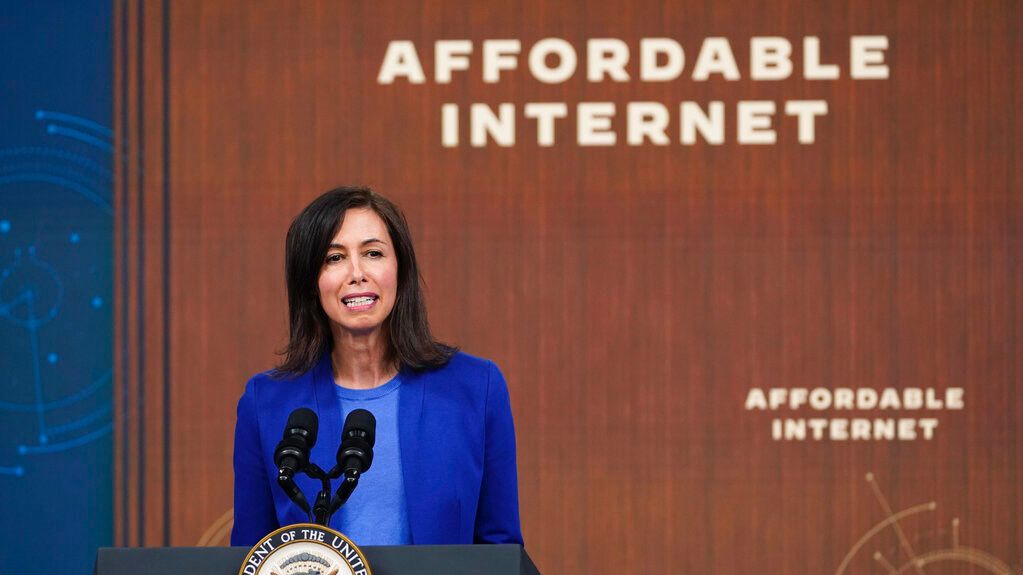With a federal subsidy for high-speed internet expected to run out of funding later this month, White House officials are calling on Congress to extend the Affordability Connectivity Program that has made high-speed internet service less expensive for millions of Americans.
“In the 21st century, affordable, reliable, high-speed Internet is essential,” Senior Advisor to the President Stephen Benjamin said Monday during a press briefing. It’s “necessary for Americans to participate in school, do their jobs, access health care and stay connected with their loved ones."
Created through the Bipartisan Infrastructure Law, the ACP was established more than two years ago. It currently provides up to $30 off monthly internet service for eligible customers and up to $75 off for households on tribal lands. About 23 million households receive the subsidy, the Biden administration said.
Federal Communications Commission Chair Jessica Rosenworcel sent a letter to U.S. Senate Commerce Committee Chair, Senator Maria Cantwell, D-Wash., on Tuesday to say the ACP “is on the brink of shutting down due to lack of funding” and to urge Congress to act on providing additional money for the program.
Rosenworcel said in accordance with pre-established wind-down procedures for the program, households receiving ACP subsidies will begin receiving notices this month from their internet providers notifying them that their full subsidies are about to end. Beginning in May, some households may still receive a partial discount of $7 to $16, the FCC estimates.
“These notices are required to help ACP households avoid service disruption and bill shock following the loss of the support provided by the program,” she wrote, adding that the ACP will close after May “absent additional funding from Congress.”
The median price for internet service in the United States is about $75 per month, according to Consumer Reports, putting it out of reach for many low-income communities. Administered by the FCC, the ACP is the largest federal internet subsidy ever offered and is larger than the federal Supplemental Nutrition Assistance Program.
About half of those receiving the ACP benefit are military families and a quarter are seniors, the White House said. The rest are families with school-age children eligible for free or reduced-price lunches, low-income college students and households on tribal lands.
More than three quarters of U.S. states, as well as the District of Columbia and Puerto Rico have ACP participation rates of 30% or more among eligible households, Rosenworcel said in her letter to the Senate Commerce Committee Chair. A recent FCC survey found that 77% of households receiving the ACP subsidy said losing it would disrupt their service either by making them change their service plan or drop their internet service entirely.
On its website, Comcast says it’s “urging Congress and the White House to renew ACP funding and keep these important resources available to the millions of people using it to connect to the Internet.”
Spectrum News’ parent company, Charter Communications, is one of the internet providers that offers the ACP benefit and has created a pre-written email for customers to send to their elected representatives to inform them they need the program extended or replaced.
"Despite our best efforts, the federal government anticipates funding for the Affordable Connectivity Program (ACP) may only remain through the month of April 2024, impacting over 23 million families across all Internet and Mobile providers nationwide," a message on Spectrum's website reads.
Charter Communications CEO Chris Winfrey said on the company's most recent earnings call that "we're hopeful that the ACP can be refunded in order to keep households that are in the program today connected to the Internet."
AT&T Internet has crafted a similar prepared email for its customers to email to their Congressional representatives and the White House.
“We’ll work with customers enrolled in the ACP to find the solution that’s right for them should funding end, but we urge the government to act on a more permanent solution,” AT&T Internet spokesperson Alex Byers told Spectrum News, adding that some customers are eligible for high-speed internet that costs $30 per month. “If they fail to do so, we’re committed to providing options to help our customers adjust and have a variety of flexible plans available.”
Last week, the Bipartisan Problem Solvers Caucus announced it had endorsed the Affordable Connectivity Program Extension Act that was introduced in January. The bill extends and provides funding for the ACP through the end of 2024 and also provides a one-time discount to purchase a connected device, such as a computer. The bill currently has more than 215 co-sponsors but lacks enough support to pass, but despite bipartisan support for the bill, it has stalled in the House. It's not clear why the legislation has not yet been taken up.
In October, the White House proposed a $6 billion supplemental request to continue funding the ACP that has not been granted.
The Biden administration has made high-speed internet access a cornerstone of its Investing in America agenda. Last year, the president said the federal government planned to distribute more than $42 billion to deliver broadband across the country as part of the Bipartisan Infrastructure Law’s Broadband Equity, Access and Deployment program.
Spectrum News has also reached out to Viasat HughesNet, Frontier and Verizon for further comment.



